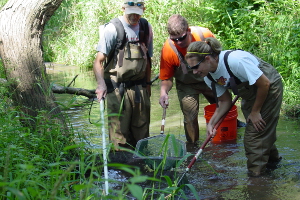Education / Outreach
Demonstrations / Classroom Presentations
The Limnology Section's participation in educational/outreach activities has increased tremendously in recent years. Heightened interest in water quality related topics and the environment in general has generated a flood of requests from schools (K-12), colleges, and citizen groups for presentations and assistance. Outreach activities might include demonstrating electrofishing to a high school ecology class, packing up our Bug Road Show which consists of aquatic insects from local streams and microscopes for viewing by a kindergarten class, or assisting a citizen volunteer monitoring group design a sampling program for the river in its community. Contact us to schedule a visit or demonstration to your classroom or organization.
Whats wrong with my pond?
We receive many calls from landowners inquiring about testing their ponds. Often they have seen dead fish or the pond is green or "scummier" than it has been previously. Unfortunately, there is no one test that can point to what the problem may be. There are multiple water quality parameters that may be used but these can become expensive. To complicate things further, the cause of something like a fish kill may not be evident even a day or two after it occurs. Often, the reasons will never be known or are attributable to natural causes, but there are several points to consider:
Winterkill - Dead fish found immediately after ice-out are likely a result of winterkill. Hard winters with prolonged periods of snow-covered ice may result in the depletion of oxygen in the water. Even thick, clear ice allows light to reach plants and algae in the pond. If light is present the plants and algae produce oxygen during photosynthesis. The snow prevents light from reaching the water, causing water plants and algae to die and decompose. Decomposition uses up the oxygen in the water and if it is reduced enough, a fish kill occurs. Winterkill may kill all fish in a pond.
Summerkill - This is also a result of low oxygen levels, usually occurs during the hottest part of the summer, and is often associated with an algal bloom die-off. Basically, more oxygen is being consumed (respiration/decomposition) than is being added to the water by photosynthesis or diffusion from the atmosphere. After a string of warm, calm, cloudy days oxygen levels may decline enough to cause a kill. A similar weather pattern also promotes stratification (layering), which isolates the lower depths of the pond from mixing with the upper layer. The lower waters quickly become oxygen depleted. A strong wind or rain may break the stratification and the oxygen depleted water begins mixing again with the upper layer, sometimes causing a kill. This type of turnover event will often make the water appear brown instead of green for a few days. Regardless of the exact mechanism, summerkills are usually partial kills, with many or most fish surviving.
Watershed - The activities in a pond's watershed (land from which surface water drains into the pond) can greatly influence pond character and the likelihood of fish kills. Iowa soils are very fertile and our surface waters are naturally, quite productive. There are plenty of nutrients available in ponds that have a fairly natural (completely wooded or grassed) watershed. Watersheds containing row crops, livestock, or even residential/suburban development provide excess nutrients and sediment to a pond. Ponds with these activities in their watersheds are more prone to pea soup algal blooms or excessive plant growth. The extra material for decomposition makes them more susceptible to low oxygen levels and fish kills. They may also experience chemical-related fish kills associated with heavy rain/runoff following pesticide, fertilizer, or manure application to fields or lawns.
Natural Causes? - Even ponds with great watersheds sometimes experience problems. Unusual algal blooms can appear when the right conditions of light, nutrients, and temperature happen to coincide. Partial fish kills occur with no obvious cause. Feel free to contact us but there may be situations where there is no definitive answer. Your district IDNR fisheries biologists have great experience with pond matters. The Iowa State University Extension also has a person specializing in fisheries/ponds- Richard Clayton 515-450-3760.
Miscellaneous sampling and services
Though most of the Limnology Section's work is related to ongoing programs or multi-year projects with the IDNR, we conduct many smaller studies for counties, municipalities, businesses and individuals. From a several month small watershed study for a county Soil & Water Conservation District to a one-time sampling of a landowner's pond or stream, our services are available for any person or group seeking water quality-related sampling or testing.



